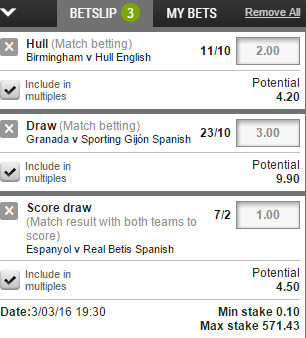Multiple Bets Explained
RIGHT, here's a multiple bets guide for you to cut out and keep. Loads of punters have been asking about perms and how to work out how many bets to make. So I hope the following is useful. Trixie 3 (3 doubles, 1 treble) = 4 bets. Patent 3 (3 singles, 3 doubles, 1 treble) = 7 bets. Most novice sports punters will start off with a single bet but soon they will place a multi bet, also known as a multi, multiple, accumulator, parlay or all-up. Multi bets are riskier than single bets but they have the potential to pay bigger dividends. Bet $114 in a sixfold multi bet. Bet of $150, which gives us a profit of about $895.05 (slightly different because of rounding). If you’ll notice, that is the same number from our parlay example above. Technically, the sportsbook is throwing no additional money into these bets. They are just letting you tie multiple bets together to get a bigger, but less likely to win payout.
- Betway Multiple Bets Explained
- Horse Racing Multiple Bets Explained
- What Does Multiple Bets Double Mean
RIGHT, here's a multiple bets guide for you to cut out and keep.
- Multiple bets are popular with punters of all ages, both in shop and online. Multiple bets offer punters the chance to win big from relatively small stakes. There are a multitude of multiple bets but the four most common are a Lucky 15, a Yankee, a Patent and a Trixie. In this article we will look to explain in more details these popular bets.
- The goliath is an 8 selection wager consisting of 247 bets: 28 doubles, 56 trebles, 70 four-folds, 56 five-folds, 28 six-folds, 8 seven-folds and an eight-fold accumulator. Named after the huge number of bets that together make this wager, the goliath is one of the largest bets available and is best left to experienced punters.
Loads of punters have been asking about perms and how to work out how many bets to make. So I hope the following is useful.

Trixie 3 (3 doubles, 1 treble) = 4 bets.
Patent 3 (3 singles, 3 doubles, 1 treble) = 7 bets.
Yankee 4 (6 doubles, 4 trebles, 1 fourfold) = 11 bets.
Canadian 5 (10 doubles, 10 trebles, 5 fourfolds, 1 fivefold) = 26 bets.
Heinz 6 (15 doubles, 20 trebles, 15 fourfolds, six fivefolds, 1 sixfold) = 57 bets.
Super Heinz 7 (21 doubles, 35 trebles, 35 fourfolds, 21 fivefolds, seven sixfolds, 1 sevenfold) = 120 bets.
DoubleBetway Multiple Bets Explained
 - In a Double you bet on the outcome of two consecutive races. In a Win Double for example you will pick the first horse across the line in two races. The pay-off from the first race will the be used to stake the second race, saving you the trouble to stake on each race individually. It also increases the stakes in the second race, promising you a higher return if your second horse wins. However, if you lose in the first race of a Double you are left without stakes for the second race. Just the same if you win in the first race but lose in the second, there will be no pay-off for you. A Double only pays-off if both races included in the bet are won.
- In a Double you bet on the outcome of two consecutive races. In a Win Double for example you will pick the first horse across the line in two races. The pay-off from the first race will the be used to stake the second race, saving you the trouble to stake on each race individually. It also increases the stakes in the second race, promising you a higher return if your second horse wins. However, if you lose in the first race of a Double you are left without stakes for the second race. Just the same if you win in the first race but lose in the second, there will be no pay-off for you. A Double only pays-off if both races included in the bet are won. Treble - The Treble bet works exactly like a Double, with three races instead of two. Again you must win all three races in order to get a return at the end. While this is risky, the automatic increase of your stakes makes for a much larger pay-off than betting on each race individually.
Horse Racing Multiple Bets Explained
Accumulator - An Accumulator bet includes four or more races and follows the same principle as the Double and Treble
Multiple Each-Way Bets - The multiple Each-Way has two variations; 'Win to Win, Place to Place' and 'Each-Way All Each-Way'.

What Does Multiple Bets Double Mean
In a 'Win to Win, Place to Place', which is the most commonly used variation, the returns from the Win selection of the Each-Way are added to the stakes for the Win selection for the next race. The returns of the Place selection of the Each-Way add up the the stakes for the Place selection in the next race. This way the stakes on the Place selection will be lower than those on the Win selection after the first race. An 'Each-Way All Each-Way'will ultimately bring lower returns than the 'Win to Win, Place to Place', but it does keep you guarded from loosing all. In this variation you chose the pay-off from one selection after the first race - so either the returns from the Win bet or the Place bet - and divide it to form the stakes for the Win and Place selection in the next race. This way your stakes will not be as high, meaning a lower pay-off; however, you run little risk of ending up empty handed. As it is the less usual form of the multiple Each-Way bet, you will have to request it on your betting slip specifically.